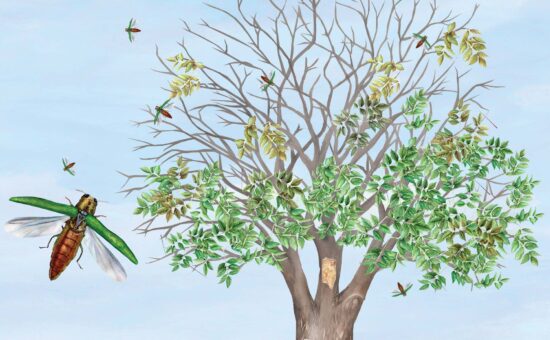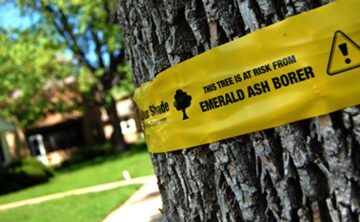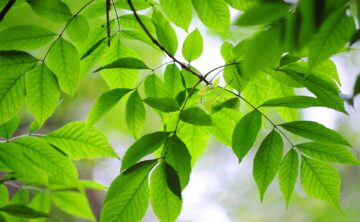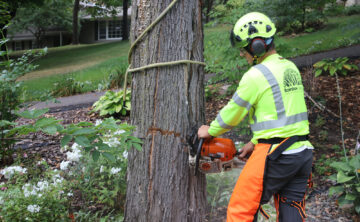Save YourvTree: Treatment for Emerald Ash Borer
If you live in the Minneapolis & St. Paul metro, there is a good chance you have an ash tree. This common tree species was frequently planted in landscapes and boulevards before 2009. Unfortunately, all unprotected ash trees are at a high risk of dying from the invasive emerald ash borer (EAB).
While many infested trees have already been cut down, there is effective ash tree protection available for healthy trees. If you have a large, well-placed, healthy ash tree, we can still protect it with our emerald ash borer prevention services, helping you retain the benefits of a mature tree and preserving our urban canopy.
The experts at Rainbow Treecare are committed to saving the urban forest — one tree at a time. We’ve helped prevent emerald ash borer in 60,000 ash trees in the Twin Cities. Schedule your ash inspection, and take action before it is too late!


What can you expect from our emerald ash borer protection service?
The first step in our emerald ash borer service is an inspection of your ash tree by one of our tree experts. We will evaluate your tree to determine if treatment is still an option. Ash tree protection considerations include:
- Tree size greater than 10” in diameter
- Tree is not competing with other trees, buildings, or infrastructure
- Tree shows no more than 30% of canopy decline if an infestation is suspected
Emerald ash borer protection in Minnesota: Is it worth it?
If your ash tree is healthy and meets the considerations listed above, time is of the essence. We recommend seeking ash tree protection as soon as possible.
Please keep in mind that EAB treatment professionals can only treat trees when your tree has green leaves. That means that treatment for emerald ash borer in Minnesota typically occurs in from late May through early September.
Our licensed technicians perform EAB treatments by injecting a product into the tree’s trunk above the soil line. The tree takes the product into its vascular system, the same way nutrients and water are distributed throughout a tree. This process allows the product to reach the tree’s living parts, including the leaves, twigs, branches, and trunk. As the product is distributed, the emerald ash borer protection spreads to every part of your ash tree.
Of course, not every ash tree is a good candidate for ash tree protection. If ash borer is already affecting your tree or your tree isn’t well placed, our ash tree services also include tree and stump removal if that is the recommended option for your ash tree. Prompt removal is critical, as dead ash trees become brittle quickly and pose a safety risk.
Why choose the experts from Rainbow Treecare?
We are Minnesota’s premier licensed and insured tree experts. With over 45 ISA Certified Arborists on staff, we are highly skilled in assessing and performing the services that enhance the health and longevity of your trees. Many factors contribute to a tree’s overall health, including site-specific concerns such as nutrient levels or compacted soil. Our tree experts will address the bigger picture to provide the best treatment outcomes. Additionally, one of our core values is safety. You can rest easy knowing our team will perform all services while taking every precaution to keep our staff, bystanders, and your property safe.
Additional frequently asked questions about emerald ash borer
The emerald ash borer (EAB) is an invasive beetle from Asia. EAB was first discovered in the United States in 2002 near Detroit, Michigan, and has since spread throughout the country. It was found in St. Paul in 2009, and every county in the Twin Cities has infestations. EAB has quickly become one of the most destructive and costly forest insects in urban forest history.
EAB larvae feed on the inner bark of ash trees, which disrupts the tree‘s ability to transport water and nutrients. EAB populations can grow exponentially yearly because the beetle has few natural predators, and our ash trees have limited natural defenses. Once an ash tree is infested, it has almost zero chance of survival. Proactive treatment is the only proven and reliable method of saving an ash tree.
With an estimated 1 in 5 trees in the Twin Cities metro area being an ash tree, losing this many of them is comparable to a natural disaster with a significant environmental and economic impact. When EAB is not managed, annual ash tree deaths can quickly overwhelm the resources required to remove dead and dying trees. This results in a large number of hazardous dead trees, along with a significant financial burden to both property owners and cities. Read more about the ongoing impact on the Twin Cities urban forest due to emerald ash borer.
The cost of treating your tree is based on the size of the tree. Tree size is determined by measuring the DBH (diameter of the tree at breast height, or 4.5 feet off the ground). Treatments typically range from $70 to $200 per tree in the metro area and are recommended every two years. Protection costs significantly less than removal and replacement, and you retain the value of a mature tree on your property.
Rainbow Treecare partners with over 35 cities and neighborhoods throughout the Twin Cities to treat public trees in parks and along boulevards. These partnerships also include a citywide discount to private property owners. This discount program allows property owners to treat their ash trees at a reduced price. Find out if your city has a partnership with Rainbow Treecare!
The cost of removing a tree is based on several variables. A small tree with no obstacles may cost several hundred dollars to remove, while a large, hard-to-access tree near a structure can cost thousands. Unfortunately, trees in decline are more challenging and costly to remove. Stump removal is also an additional cost.
If you remove a tree, replanting is recommended. Depending on the size of the replacement tree and whether you hire a professional to plant it, tree replacement can cost between $50 and $400.
Schedule your service today!

Emerald Ash Borer (EAB) in Minnesota Report for 2022
What is the status of Emerald Ash Borer in Minnesota? As of May 2022, EAB has been found in 40 counties across the state of

Is My Ash Tree Worth Saving?
Emerald ash borer has been in the Twin Cities and greater Minnesota since 2009. There are established populations of emerald ash borer (EAB) throughout the

Why Hire an Expert for Ash Tree Removal
Prior to the emerald ash borer’s discovery in 2009 in St. Paul, Minnesota, approximately 20% of the urban canopy were ash trees. As this destructive

Finding the Right Ash Tree Replacement in Minnesota
Many people across Minnesota are losing their ash trees because of Emerald Ash Borer (EAB), an invasive species of beetle from Asia. EAB larvae feed on the




